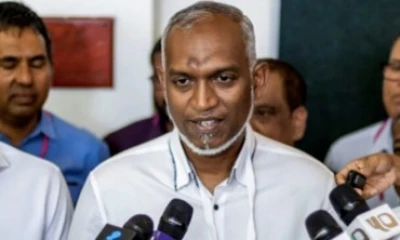Maldives President Mohamed Muizzu’s party has secured a sweeping victory in the parliamentary elections held on Sunday, showing strong support for his pro-China stance and divergence from traditional ally Bharat.
The People’s National Congress-PNC, led by Muizzu, has clinched a commanding majority in the 93-member parliament, as per preliminary results announced by the Elections Commission of Maldives.
“With more than two-thirds of the seats secured, the PNC has solidified its position, set to drive forward its agenda,” stated provisional results.
Muizzu’s party secured a remarkable 66 out of 86 declared seats, ensuring a super-majority. The formal confirmation of results is anticipated within a week, with the new assembly set to commence its term from early May.
The election outcome notably reflects a gender disparity, with only three women candidates out of a total of 41 elected, all representing Muizzu’s PNC, as reported by local media outlet Mihaaru.
This electoral victory is seen as pivotal for Muizzu’s vision to strengthen economic ties with China, including ambitious projects such as the construction of thousands of apartments on reclaimed land, despite controversy surrounding such endeavours.
Previously hindered by a lack of parliamentary majority following his presidential election victory in September, Muizzu’s enhanced mandate signals a significant shift in Maldivian political dynamics.
In contrast, the main Opposition Maldivian Democratic Party-MDP, which previously held a super-majority, suffered a notable setback, projected to secure only a dozen seats.
Muizzu, who cast his vote early in the day at a polling station in the capital Male, underscored the importance of citizen participation in the electoral process, urging all Maldivians to exercise their democratic right.
The Maldives, susceptible to the impacts of climate change due to its low-lying geography, faces pressing challenges such as rising sea levels. Muizzu has proposed ambitious initiatives to mitigate these risks, including land reclamation and infrastructure development, drawing both support and criticism from various quarters.
While the Maldives remains renowned for its luxurious tourism offerings, the nation has increasingly become a focal point in geopolitical discussions within the Indian Ocean region, owing to its strategic location and maritime significance.
Muizzu’s victory in last September’s presidential election, representing a pro-China stance, marked a departure from the previous administration’s alignment with India. Recent infrastructure contracts awarded to Chinese state-owned companies underscore this shift in diplomatic orientation.
Furthermore, Muizzu’s administration has initiated the withdrawal of Indian troops stationed in the Maldives, signalling a recalibration of diplomatic relations with New Delhi.
As the electoral process concluded with a high turnout of 73 per cent, the stage is set for a new chapter in Maldivian politics, characterized by evolving geopolitical dynamics and strategic alignments.

















